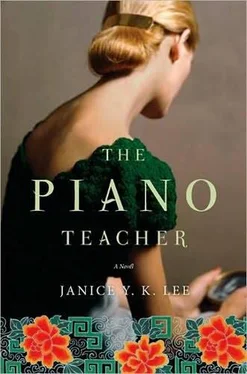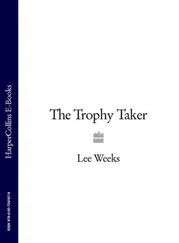“Yes?”
“Une question pour toi.”
“Yes?”
“The good general is interested in me for many reasons,” she begins. “One of which is that I’m rather pretty. But, as you know, Hong Kong is filled with pretty women, and so his interest in me has lasted the time it has because he is also very interested in assuring his future while he’s here. An ambitious man, Otsubo. And he thinks I should be able to help him. And being a man of large appetite, he is not content with the occasional wristwatch and woman’s trinket-his sights are set much higher. He’d take land if his government would let him, but it won’t, and he’s getting rather frustrated.” She pauses. “There are those in Tokyo who are particularly interested in the Crown Collection of Hong Kong. It’s supposed to have many priceless Chinese pieces, centuries old, inestimable in their value, politically sensitive, of course. And those have not been found. It’s thought they were secreted away before the war began here. And the Chinese want their heritage back, the Japanese want them for their value, and the English think it all belongs to them. It’s very confusing.
“To make a long story short, Otsubo thinks that a few of the men in Stanley are privy to information that would help him locate these pieces. In particular, he has an idea that Reggie Arbogast knows where it is. I think Otsubo would be handsomely rewarded for locating these items and getting them back to Japan. You know, it’s been a complete madhouse over here with the looting and the ransacking and things turning up in the market places, museum pieces selling for two cents or worthless twaddle being shipped off to the homeland like it’s worth something. No one really knows what’s going on, but he’s determined to find these pieces. He’s had me look through the pawnshops and talk to people, but nothing. So, that is why he furloughed you and wanted to have dinner with you and talk to you.”
“But why would he think I would know anything about it?”
“He’s heard that you are well liked in camp. You’ve been elected head of something or other, haven’t you?”
“What’s that got to do with it?”
“Do you know anything?”
The abrupt question takes him by surprise.
“Do you wish I did?”
“Does that mean you do?”
He stands up. The parrying is sickening to him.
“Trudy, we’re not at war with each other.”
“No, but we might be at cross-purposes. Will, I need something from you now.”
“Everything I have is yours.” It sounds false, even to him, metallic in his mouth, as he watches her desperate, dissembling face. What does she inspire in him now? Still love? Or pity?
“So, you’ll help us?”
What could he do? She didn’t ask for herself. She asked for them. She was lost already.
MISS EDWINA STORCH, an institution in Hong Kong, hosted occasional ladies’ lunches at her home in the New Territories. She was the headmistress emeritus of a well-regarded primary school in Pokfulam and a renowned expert on Chinese porcelains-an old China hand who had retired to the New Territories. She lived famously in an old house with Alsatians, chickens, an elderly married Chinese couple in service, and another English spinster-her lifelong partner, Miss Winkle. They sometimes came for lunch at the Ladies’ Recreation Club, where Claire had seen them holding court among the other expatriate women, and she had seen Miss Winkle wrestling carnations into submission at Mrs. Beazley’s flower-arranging class at the Duddell St. YWCA. Miss Winkle was small and slight, with frail bird bones, and Miss Storch was large and heavy, with thick calves that ended in a straight line at her feet. They both wore knee-length skirts and white cotton buttoned blouses with Peter Pan collars and often took slow constitutionals around the country-side with their sensible shoes and large dogs. Her invitations were rarely turned down, for some reason that Claire had not been able to glean. So when her invitation arrived in the mail, heavy cream bond with a gold crest-rather much for a retired schoolmistress, she thought-she accepted with curiosity.
Claire drove up to a white wooden gate. She had to get out of the car to open the gate, drive through, and then get out to close it again, with a little hook that had been haphazardly screwed into the wood. Somehow, she didn’t dare leave it open, although she knew some twenty people had been invited for lunch. She drove up a dusty road, past gracious old trees, one with a wooden swing attached to a large branch, to the house itself, a rambling stone structure that seemed on the verge of falling down. There was a porch, with a screen door slightly ajar, but she walked around the house to the back garden, where she could hear music and voices.
Alongside the house there was a drinks table set up with a bucket of ice and various mismatched glasses, a large punch bowl, and small egg salad sandwiches that were already attracting flies. Five other people had already arrived, none of whom Claire recognized. Then Miss Storch came over to greet her, walking slowly with a cane.
Miss Storch was one of those people so comfortable with herself that everything she did seemed unsurprising. If she served you wine in a teacup, it would seem the most natural thing in the world, and that anyone thought otherwise was hopelessly bourgeois. Her lunch was, Claire would discover, rabbit pie, tomato soup white bread tomato sandwiches, and ice cream on a stained cotton tablecloth in a weathered old tent outside in the garden. At each chipped place setting was a carved camphor wood fan to stir up the hot and humid air. Women stood around fanning themselves as they sipped warm lemonade and ate cocktail sausages and pineapple speared onto toothpicks.
“So nice to meet you,” Miss Storch said. “I’ve been meaning to have you over.”
“The pleasure’s mine, Miss Storch,” Claire said. “I’ve heard wonderful things about you.”
“Edwina, please, and call Miss Winkle Mary. I’m giving you permission right now.”
“That’s very kind.” Claire was very aware of Miss Storch’s intelligent, razor-sharp gaze. Beads of perspiration trickled in her décolletage. “Do you have these lunches often? I’ve heard of them, of course, but didn’t know if they were…” She trailed off, unable to come up with the words to complete the sentence.
“Mary and I live so far out, although this is the way we choose to live. We like people, and it’s hard to see them out here, so we came upon this idea, to have regular lunches, and people seem to like them, luckily, so they make the effort to come. We’ve had most everyone out here, a few governors, the occasional lord and lady, many travelers in from England. You know.”
“And you’ve been in Hong Kong long?”
“Longer than you would believe, child.”
“Oh!” A large Doberman had come up and nosed her hand.
“That’s Marmaduke, the dear,” said Miss Storch affectionately. “He keeps us safe and eats his weight in scraps every day.”
“Do you have more dogs?”
“We have seven, but most of them are out roaming around right now. They’ll come home for dinner. We adopted them after the war when there were so many animals looking for homes. We couldn’t bear to say no, and we ended up with far too many. There are eight budgerigars in the house, with three cats who would love to eat them, and I think there’s a terrapin somewhere in the kitchen as well.”
“Were you here during the war? ”
“Of course, through all the madness and its aftermath.” Miss Storch adjusted her spectacles. They were steaming up in the heat. Her eyes bulged behind them, her skin red and fleshy.
“A friend of mine…” Claire stopped.
Читать дальше












